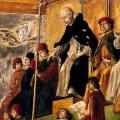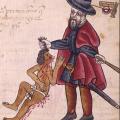440. Longitudinal Studies: Exploration and Science
Iberian expeditions to the Americas inspire scientists, and Matteo Ricci’s religious mission to Asia becomes an encounter between European and Chinese philosophy.
Themes:
• L. de Albuquerque, Ciência e Experiência nos Descobrimentos Portugueses (Lisbon: 1983).
• R. Alvarez Peláez, La conquista de la naturaleza americana (Madrid: 1993).
• O.T. Almeida, “Portugal en los albores de la modernidad científia (siglo XVI),” Abriu 8 (2019), 137-52.
• A. Barrera-Osorio, Experiencing Nature: The Spanish American Empire and the Early Scientific Revolution (Austin: 2006).
• D. Bleichmar et al. (eds), Science in the Spanish and Portuguese Empires, 1500–1800, (Stanford: 2009).
• D.C. Goodman, Power and Penury: Government, Technology, and Science in Philip II’s Spain (Cambridge: 1988).
• H. Kamen, Spain’s Road to Empire: The Making of a World Power, 1492–1763 (London: 2002).
• M. Laven, Mission to China: Matteo Ricci and the Jesuit Encounter with the East (London: 2011).
• R. Padrón, The Spacious Word: Cartography, Literature and Empire in Early Modern Spain (Chicago: 2004).
• R.Á. Peláez, La conquista de la naturaleza americana (Madrid: 1993).
• J.M. López Piñero, V. Navarro Brotons, and E. Portela Marco, Materiales para la historia de las ciencias en España: s.XVI-XVII (Valencia: 1976).
• J.M. López Piñero, Ciencia y técnica en la sociedad española de los siglos XVI y XVII (Barcelona: 1979).
• R. Po-Chia Hsia, A Jesuit in the Forbidden City: Matteo Ricci 1552-1610 (Oxford: 2010).






Comments
Great to hear so many…
Great to hear so many Portuguese and Spanish names in the podcast - and, of course, to hear Brazil being mentioned for the first time! (I know you talked about Brazil in the Abdias do Nascimento episode, but that was in the Africana series). Philosophy and science from the early modern Iberian Peninsula seem, at least for me, to be almost completely neglected in mainstream discussions - except when one, discussig Descartes education and influences, briefly mentions Suárez. You're being really faithful to the "without any gaps" motto, Peter. I'm looking forward to the next episodes!
In reply to Great to hear so many… by Caio Lopes Alc…
Iberian philosophy
Thanks! And there’s a lot more to come from Iberia since that will be the main focus for this mini-series on the counterreformation. By the way in addition to the Nascimento episode we did also have this earlier Africana episode, just so you don’t miss it:
https://www.historyofphilosophy.net/abolitionism-brazil
I'm getting more and more interested in Meso-American Philosophy
I will hope once you conclude Classical Chinese Philosophy you will focus on Meso-American/Native American Philosophy and Colonial Latin America as it would be analogues to what you did with Africana (Pre-Colonial/Colonial).
Structure would be 2 series - Meso Amerian/Colonial Latin America up to the 20th century. 2nd series being 20th century.
Plus with the recent focus on Iberian Philosophy in the Catholic reformation and you will be covering ;I believe Iberian Philosophy once again in the next series with France-Netherlands (As the Dutch gain independence from Habsburg Spain during the 80 year war) it makes the most sense to move on Latin America once you've finished Classical China.
By then Professor, you have covered the entire world (other than Oceania).
A very fitting episode right…
A very fitting episode right before the start of the Chinese series! Although I think you were the tiniest bit fast on the gun when you said "we had only just started our coverage of classical Chinese philosophy", when the first episode hasn't started yet.
Also Ricci's line that "Confucius' ignorant of the other world {etc}" has me wondering - are you going to cover the Chinese Rites controversy? Or the general debate about if Confucianism counts as a religion or not?
In reply to A very fitting episode right… by Andrew
Jumping the gun
Yes I think I miscalculated the date on when this would come out, when I wrote that sentence! But it's only premature by one week so close enough.
I am not sure we will really get into the question "is Confucianism a religion?" as such, since it seems to me a somewhat unhelpful framing (sort of like these constant "but is this really philosophy?!" questions one gets about mysticism or whatever), but we will definitely talk a lot about rites and ritual.
In reply to Jumping the gun by Peter Adamson
I didn't mean rites in…
I didn't mean rites in general, but the controversy in the catholic church about whether ancestor worship was religious rites or not. That seems like a debate that could have philosophical implications drawn from it (there was also other stuff from that debate that I'm less certain would have philosophical ideas though, like debating the most appropiate name for God in Chinese. Catholics are currently only allowed to use 天主 Tiānzhǔ (Lord of Heaven), while forbidden from using 天 Tiān (Heaven) or 上帝 Shàngdì (Lord Above / Supreme Emperor)). The general question of if "Confucianism is a religion or not" might not be interesting for the podcast for reasons you gave, but I had more in mind anyway just the debaded status of Confucianism as received among the incoming Catholics.
In reply to I didn't mean rites in… by Andrew
Rites
Oh I see, sorry. I think I'll be mentioning that in the upcoming episode on the Jesuit, at least obliquely. Because I need to talk about their policy of accommodation to local populations and where the limits were for this.
Chinese Rites
I was hoping for the Ricci bit to end with some mention of the Chinese Rites controversy, but oh well.
Speaking of the Jesuits, are we ever going to get back to Galileo? The poor guy's been waiting around since 2021.
In reply to Chinese Rites by Neville Park
Galileo
I will say something about the Rites controversy when we get to the Jesuits, so not too far off.
And yes Galileo is coming (again)! He will be the last topic in the Counterreformation series.
Add new comment